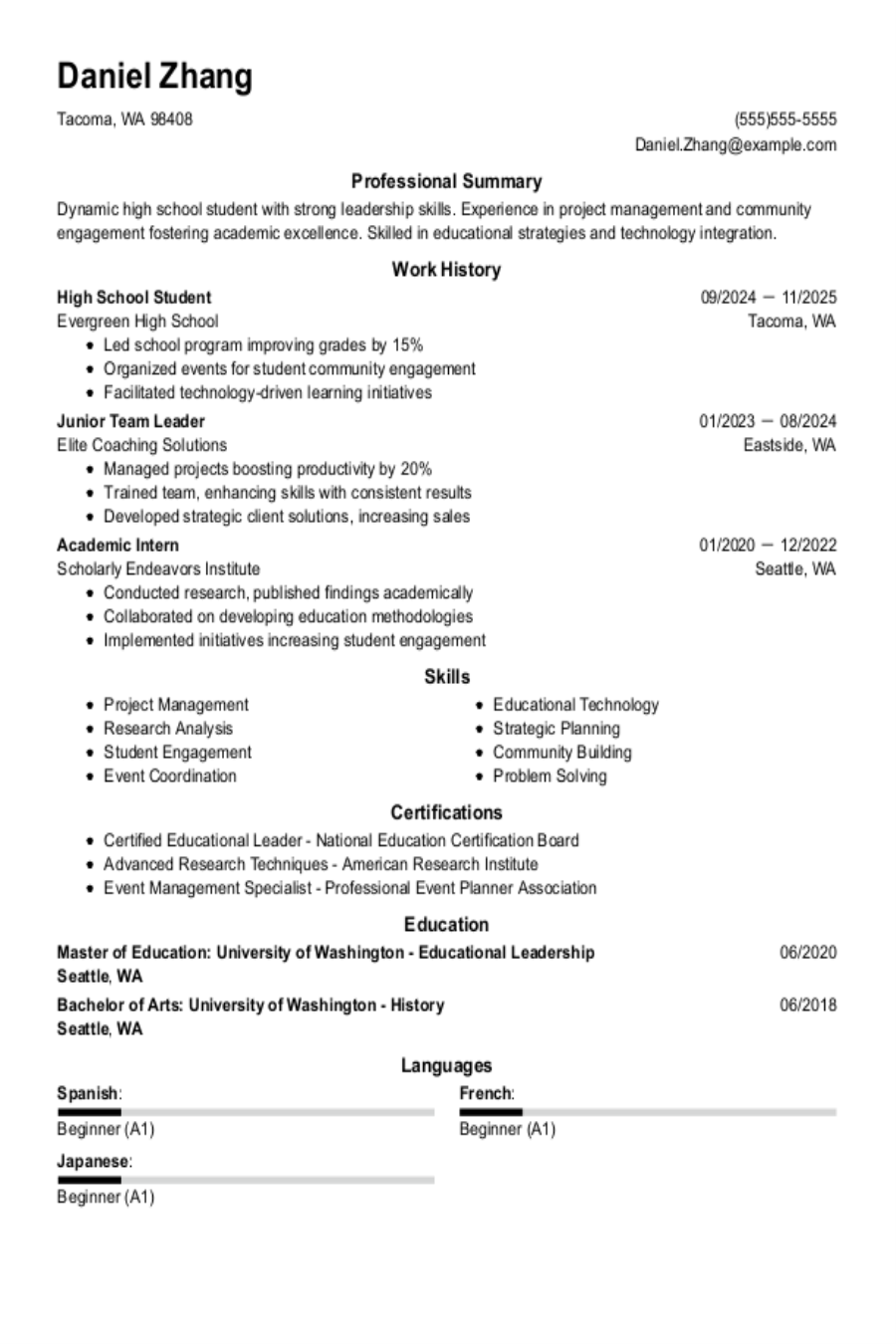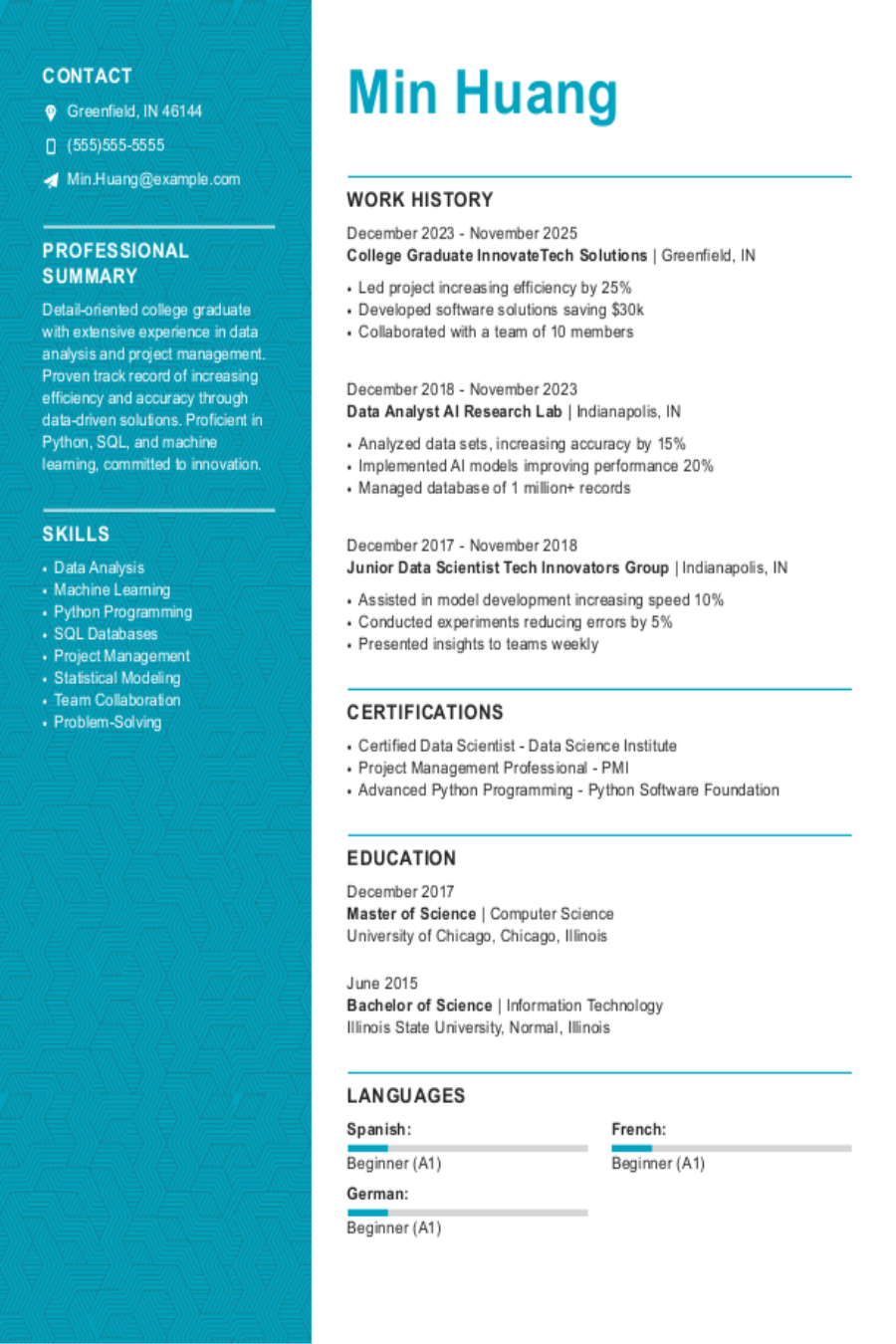Popular Paralegal Resume Examples
Entry-level paralegal resume
An entry-level resume for a paralegal should focus on relevant coursework, internships, certifications, and transferable skills to effectively demonstrate qualifications despite limited professional experience.
Places skills over experience: Using a functional resume format is strategic for this candidate as a recent graduate because it highlights their legal skills, like document drafting and case management, rather than their limited work history.
Prioritizes readability: Choosing a simple resume template ensures recruiters can quickly navigate this document. This clarity emphasizes key qualifications and achievements, helping hiring managers quickly evaluate the candidate's abilities.
Mid-career paralegal resume
A mid-career paralegal should build a resume that effectively showcases their diverse experience, honed skills, and ongoing professional growth to attract the attention of potential employers.
Employs active language: Strong action verbs like "managed," "drafted," and "coordinated" highlight initiative and the ability to improve processes, showcasing a proactive approach in legal support.
Includes mix of skills: This resume effectively highlights a mix of hard skills, such as legal research and document drafting, with soft skills like client management and communication. This combination showcases the job seeker's comprehensive capabilities in the paralegal field.
Experienced paralegal resume
An experienced paralegal resume should highlight significant achievements and demonstrate clear professional growth to effectively showcase the job seeker's expertise and value in the legal field.
Quantifies achievements: Quantifiable achievements, such as managing over 500 cases and saving $50K annually through legal research, provide clear evidence of this paralegal's impact. These metrics allow recruiters to quickly grasp the applicant's capabilities and contributions.
Highlights experience: The resume opens with a compelling summary that showcases the applicant's 12 years of paralegal experience, emphasizing their skills in legal process improvement and document management.
No experience paralegal resume
A resume for an applicant with no experience should highlight relevant coursework, transferable skills, and volunteer activities to showcase the applicant's potential and commitment to the field.
Favors clarity over complexity: The resume's organized layout effectively highlights relevant legal experience and academic achievements, making it easy for employers to recognize qualifications at a glance.
Leads with education: This resume arranges the education section up front, making the candidate’s formal training a focal point of their profile.
More resume examples
Paralegal Resume Template
Looking for a solid base to build upon? Check out this paralegal resume template that you can easily modify with your personal details and achievements.
Emily Lee
Crestwood, KY 40021
(555)555-5555
Emily.Lee@example.com
Professional Summary
Detail-oriented paralegal with 8 years of experience. Expert in legal research, document management, and trial preparation. Proven track record of enhancing efficiency and accuracy in legal operations.
Work History
Paralegal
Legal Insights Partners - Crestwood, KY
January 2023
- Drafted 50+ legal documents monthly.
- Managed complex caseloads with 95% accuracy.
- Reduced research time by 30% using AI tools.
Legal Assistant
Smith & Gordon Law - Crestwood, KY
January 2019 - December 2022
- Prepared trial materials for 100+ cases.
- Streamlined filing process by 25%.
- Assisted attorneys in hearing preparations.
Litigation Support Specialist
Justice Solutions Inc. - Louisville, KY
January 2015 - December 2018
- Supported e-discovery in 60+ cases.
- Optimized document management by 40%.
- Facilitated client meetings effectively.
Skills
- Legal Research
- Document Management
- Case Management Software
- Drafting Legal Documents
- Trial Preparation
- E-discovery
- Regulatory Compliance
- Client Communications
Certifications
- Certified Paralegal - National Association of Legal Assistants
- Legal Document Preparer - American Legal Services Association
Education
Master of Legal Studies Legal Studies
Georgetown University Washington, DC
May 2014
Bachelor of Arts Political Science
University of California Los Angeles, CA
May 2012
Languages
- Spanish - Beginner (A1)
- French - Beginner (A1)
- Mandarin - Beginner (A1)
Must-Have Skills on a Paralegal Resume
A robust skills section is important for crafting an strong resume.
The following data highlights the most prevalent hard and soft skills that employers seek in paralegals as per Resume Now’s internal resume analysis.
When the time comes to improve your resume, explore the AI Resume Skills Generator for tailored suggestions. It helps you identify both hard and soft skills based on your job title, ensuring you create a comprehensive and individualized skill profile.
Writing Your Paralegal Resume
Having explored these effective resume examples, you are now prepared to dive into the specifics of how to write a resume. We will walk you through each section carefully, ensuring you understand every detail along the way.
List your most relevant skills
An effective skills section on your paralegal resume should highlight both your technical abilities, such as legal research and document preparation, and interpersonal skills like communication and teamwork. By incorporating keywords from the job listing, you make it easier for recruiters to see how you fit the role.
When building this section, pay close attention to the language used in the job description. Identify key phrases that mirror your own experiences and capabilities. Including these keywords will strengthen your application by demonstrating alignment with their needs, ultimately improving your chances of landing an interview as a capable paralegal applicant.
Example of skills on a paralegal resume
- Proficient in using legal research tools (LexisNexis, Westlaw) for comprehensive case analysis
- Adept at preparing legal correspondence, contracts, and court filings
- Collaborative team player with excellent communication skills
- Careful with strong attention to detail in documentation review
Highlighting your soft skills on your resume can set you apart from the competition. Employers greatly value interpersonal abilities, as they are often challenging to develop and play an important role in building effective teams and positive work environments.
Highlight your work history
The work experience section of your paralegal resume should focus on showcasing your achievements rather than just listing duties. Highlight specific accomplishments that demonstrate how you effectively applied your skills, and use relevant keywords to attract the attention of hiring managers.
For each job entry, be sure to include critical information such as your job title, the name of the employer, and the dates of employment. This will help employers quickly assess your professional background and establish your credibility in the field.
Example of a paralegal work experience entry
- Paralegal
Smith & Associates Law Firm - New York, NY
June 2019 - Present - Conduct comprehensive legal research and analysis to support attorneys in case preparation, resulting in a 30% reduction in case resolution time
- Draft and file legal documents including pleadings, discovery requests, and contracts with 100% compliance to court deadlines
- Assist clients by gathering necessary information for cases while maintaining confidentiality and demonstrating strong interpersonal skills
- Manage case files efficiently using electronic filing systems, increasing team productivity by 25%
- Collaborate with attorneys in trial preparation and strategy sessions, contributing to a successful win rate of over 85% in litigation cases
Aim for clarity in your resume bullet points by being concise yet informative. Focus on specific achievements, using strong action verbs to convey impact without overwhelming the reader with unnecessary detail.
Include your education
The education section of your paralegal resume should be structured in reverse-chronological order, starting with the most recent degree. Include any relevant diplomas and professional certifications while omitting your high school diploma if you've earned a higher degree. This approach emphasizes your qualifications and helps you stand out among other applicants.
If you are currently pursuing further education or have incomplete studies, list your highest completed education level along with an expected graduation date. You can also include bullet points that highlight relevant coursework or academic achievements to demonstrate your knowledge and skills.
Common certifications for a paralegal resume
- Paralegal Advanced Competency Exam (PACE) – National Federation of Paralegal Associations (NFPA)
- Certified Legal Manager (CLM) – Association of Legal Administrators (ALA)
- Civil Litigation Paralegal Certification – National Association of Legal Assistants (NALA)
- Family Law Paralegal Certification – National Association of Legal Assistants (NALA)
Sum up your resume with an introduction
Creating a strong profile section in your paralegal resume is essential for making a positive first impression. This section serves as your introduction, giving hiring managers a glimpse of your qualifications and what you bring to the table.
If you have significant experience, consider using this format to emphasize your career accomplishments. Presenting your most notable achievements right at the top of your resume is particularly helpful for recruiters who often skim resumes quickly. If you haven’t built up much experience yet, add a resume objective that speaks to your passion for career growth.
Professional summary example
Results-driven paralegal with over 5 years of experience in a dynamic litigation setting. Demonstrated ability to improve case workflows, ensuring timely preparation and submission of legal documents. Expertise in conducting thorough legal research and providing strategic support to attorneys, contributing to successful case outcomes.
Resume objective example
Enthusiastic paralegal eager to use strong communication and analytical skills to support a dedicated legal team. Committed to improving case management efficiency and ensuring thorough research contributes to positive client results.
Your resume profile should start with your job title as a paralegal. This approach, whether you choose a professional summary or an objective statement, helps employers quickly grasp your role and expertise in the legal field.
Add unique sections to set you apart
Optional resume sections are a great way for you to highlight your unique qualifications as a paralegal. These sections allow you to stand out by showcasing aspects of your experience that may not fit neatly into traditional categories.
Including relevant hobbies and volunteer work can provide insight into your professional values and skills. For instance, if you've volunteered at legal aid clinics or participated in community outreach programs, it speaks volumes about your commitment to service. Additionally, sharing interests like public speaking or research can illustrate valuable skills that improve your candidacy. These details help employers see the well-rounded individual behind the resume.
Three sections perfect for a paralegal resume
- Languages: As a paralegal, effective communication is important. If you can speak additional languages, highlight your language skills on your resume to showcase your ability to assist diverse clients and navigate legal documents more efficiently.
- Volunteer Work: Including volunteer work on a resume not only highlights your dedication to community service but also demonstrates valuable skills. It shows potential employers that you are committed and proactive in making a positive impact.
- Accomplishments: In the paralegal field, quantifiable accomplishments are important to showcase your impact on case outcomes. Include these achievements in your job descriptions or create an accomplishments section to spotlight them.
5 Resume Formatting Tips
- Choose a format that matches your career stage.
Selecting the ideal resume format hinges on your experience level. If you’re seasoned in the field, a chronological format effectively showcases your career progression. For those just starting out, a functional resume highlights your skills and potential. Consider a combination format for a well-rounded presentation of both experience and capabilities.
- Pick a smart resume template.
Select a professional resume template to improve readability. It ensures your information is prominent and clear, making it easier for employers to notice your qualifications. If you prefer designing one yourself, maintain simplicity in the layout and choose fonts that are compatible with applicant tracking systems.
- Select an appropriate font.
Opt for a clean, professional font to improve your resume's readability. Fonts like Verdana, Georgia, or Helvetica are excellent choices that appeal to both applicant tracking systems and hiring managers.
- Use consistent formatting.
Align your resume to the left and maintain equal margins on all sides. This creates a tidy, professional look that improves readability and impact.
- Keep your resume to one or two pages.
When crafting your resume, remember that resumes should be one page long to ensure clarity and focus. If you have extensive experience, a second page may be acceptable, but keep it concise and relevant to make the best impression.
What’s the Average Paralegal Salary?
Paralegal salaries vary based on location, career level, and qualifications.
This data, provided by the Bureau of Labor Statistics, will show you expected salary ranges for paralegals in the top 5 highest-paying states, including the District of Columbia. The figures reflect the most current salary data available, collected in 2024.
- Full Range
- Most Common (25th–75th percentile)
- Average
District of Columbia
Most common: $72,950 - $109,320
Washington
Most common: $61,070 - $101,790
Massachusetts
Most common: $60,370 - $92,510
California
Most common: $57,040 - $95,910
New York
Most common: $57,570 - $89,540
Tools for Your Job Search
Are you ready to apply for that paralegal position you've been targeting? Before you submit your application, consider using our ATS Resume Checker. This tool provides essential insights on how well your resume performs with the automated systems that many law firms use for initial screening.
Need more assistance in crafting your resume? Our AI Resume Builder offers tailored recommendations specific to your legal background, alongside professionally designed templates that showcase your skills and experiences effectively to hiring managers.
Frequently Asked Questions
Last Updated: October 23, 2025
Yes. A cover letter is important as it adds depth to your resume and allows you to communicate directly with employers. It’s your opportunity to express your enthusiasm for the role and highlight how your unique experiences make you a great fit. Don’t overlook this chance—write a cover letter that improves your application.
For a quick and effective way to create a personalized cover letter, check out our AI Cover Letter Generator. It helps you produce tailored content in minutes, and you can choose from various cover letter template options that align perfectly with your resume, ensuring consistency in your job application materials.
A resume is typically concise, spanning one to two pages, while a CV (curriculum vitae) can extend several pages and includes in-depth details about your academic background, research contributions, publications, and professional experiences. This difference in length allows you to showcase your qualifications more comprehensively with a CV.
You should use a CV for specialized roles in academia, law, science, or medicine where extensive detail is required. If you're preparing to create a tailored CV quickly and efficiently, our online CV Maker is an excellent tool. Choose from various CV templates designed for different industries and career levels to get started on crafting your perfect document.
Selecting the right resume format hinges on your career stage and strengths. Inexperienced job seekers often shine with a functional format, highlighting relevant skills over work history. Conversely, seasoned professionals should opt for a chronological format that showcases their extensive experience effectively. For those in mid-career, a combination format offers a balanced approach, presenting both valuable skills and relevant experience to potential employers.
A frequent resume mistake for paralegals is using a format that ATS systems cannot read. To prevent this, choose a resume template is ATS-friendly and tailor your content to reflect the specific job description. This approach improves your chances of getting noticed by hiring managers.
To ace your paralegal interview, practice answering job interview questions and answers. This preparation boosts your confidence and equips you to handle any surprises that may come your way.
To showcase your dedication to professional growth as a paralegal, consider obtaining relevant certifications and documenting them. Participate in courses, attend seminars, and engage with industry literature. Don't forget to include any insightful podcasts you listen to and membership in professional associations. These actions clearly illustrate your commitment to staying informed about the latest legal trends and practices.
Was this information helpful? Let us know!
Hailey is a career advice writer dedicated to helping job seekers excel in their careers.
More resources

What Is a CV? Curriculum Vitae Definition & Who Should Have One
Do you need to know what a CV stands for? We share the definit...

Hard Skills: 70+ Examples to Put on Your Resume
Hard skills are more important than ever in competitive indust...

AI Trends Heading Into 2026: Resume Now’s Year in Review
In 2025 artificial intelligence moved from buzzword to workpl...

Military Resume: Examples, Templates & Tips
Need a resume to help you enter the civilian workforce after a...

High School Student Resume: Examples, Templates & Tips for 2025
Was this information helpful? Let us know ...

Graduate School Resume: Examples, Templates and Tips
Planning to attend graduate school? Let our resume samples te...

